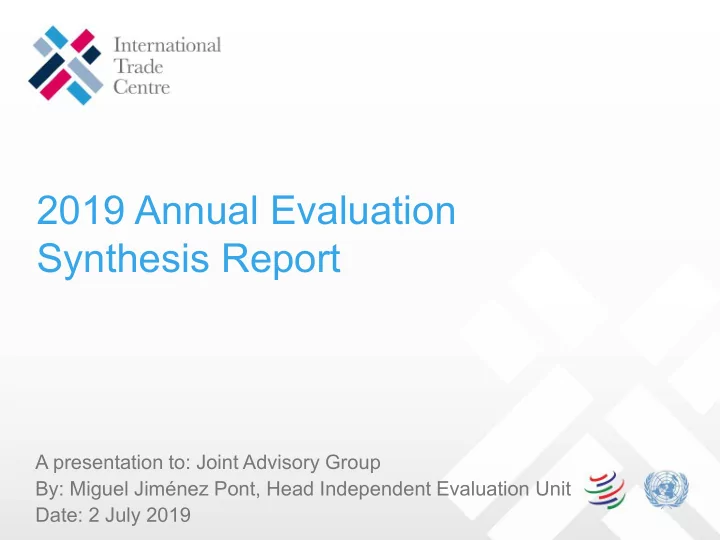

2019 Annual Evaluation Synthesis Report A presentation to: Joint Advisory Group By: Miguel Jiménez Pont, Head Independent Evaluation Unit Date: 2 July 2019
2 Seventh edition of the AESR Purpose: • convey the critical learning points generated through evaluation • generate informed debate Scope: • 10 recently completed evaluations (within April 2018 – May 2019) • 9 Project Completion Reports (projects ending in 2018) Variety of sources and contexts: • different types of evaluation • heterogeneous projects , initiatives and on-going programmes initiated as early as 2002, and as recent as 2016 • varying budgets , diverse context and different roles for ITC support Management responses to the previous AESR recommendations
3 Complexity as the AESR theme Complexity is challenging the evaluation community: • complexity of the 2030 Agenda and UN reform • increasing expectations to demonstrate contribution to SDGs OECD/DAC on-going process for adaptation : • effective synergies evaluation criterion to address complexity • dimensions: policy coherence, partnership building, and coordination What are evaluations telling us to analyze ITC performance when using this new criterion? • what are the enabling conditions to manage complexity and ensure long-term results? • has ITC achieved effective synergies as an element to measure long- term change and attribution?
4 Findings Projects are becoming more complex and managers are aware: • TISIs crucial with respect to partnership and coordination. • policy-cohesion within export strategy enables buy-in at highest and private sector levels • reaching stated targets requires mobilizing complementary forces • contextual factors embedded in risk and knowledge management By achieving synergies, ITC is adjusting to complexity requirements: • satisfactory level of effectiveness given challenging environments • clarity of objective compromised when self-generated complexity • strong sense of collective ownership • efforts to work on inclusivity improving but often still to be transformed into specific results • a culture of innovation is moving in a positive direction
5 Lessons learned • the higher the complexity the greater the risk , and with it the degree of flexibility / innovative adaptability that may be needed • synergies rooted in policy coherence , effective partnerships and coordination, can overcome the challenges related to complex interventions • in a complex intervention, partners agree on the measurement of success and are mutually accountable for it • communication and knowledge management is also about building the synergies and trust required for addressing risks • in the AfT arena, ITC is well positioned to build up a distinctive trade and sustainable development constituent
6 Incentivizing the mechanisms in place to manage complexity • Complexity is increasing and managers are aware; it is now time to monitor complexity-related risks • Since synergies are key for leveraging capabilities within the ecosystem ITC operates, they should be mandatory and tracked throughout the project cycle • to demonstrate how, why and for whom, changes are occurring, projects should have constant dialogue with partners on the intermediate steps within logframes • communication and knowledge management should be used to generate the trust and mutual engagement with partners, required to address challenges together • the successful tools and experiences that mutually reinforce business development and sustainable development should be wide spread within ITC project portfolio
2019 Annual Evaluation Synthesis Report A presentation to: Joint Advisory Group By: Miguel Jiménez Pont, Head Independent Evaluation Unit Date: 2 July 2019
Recommend
More recommend